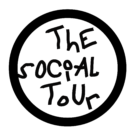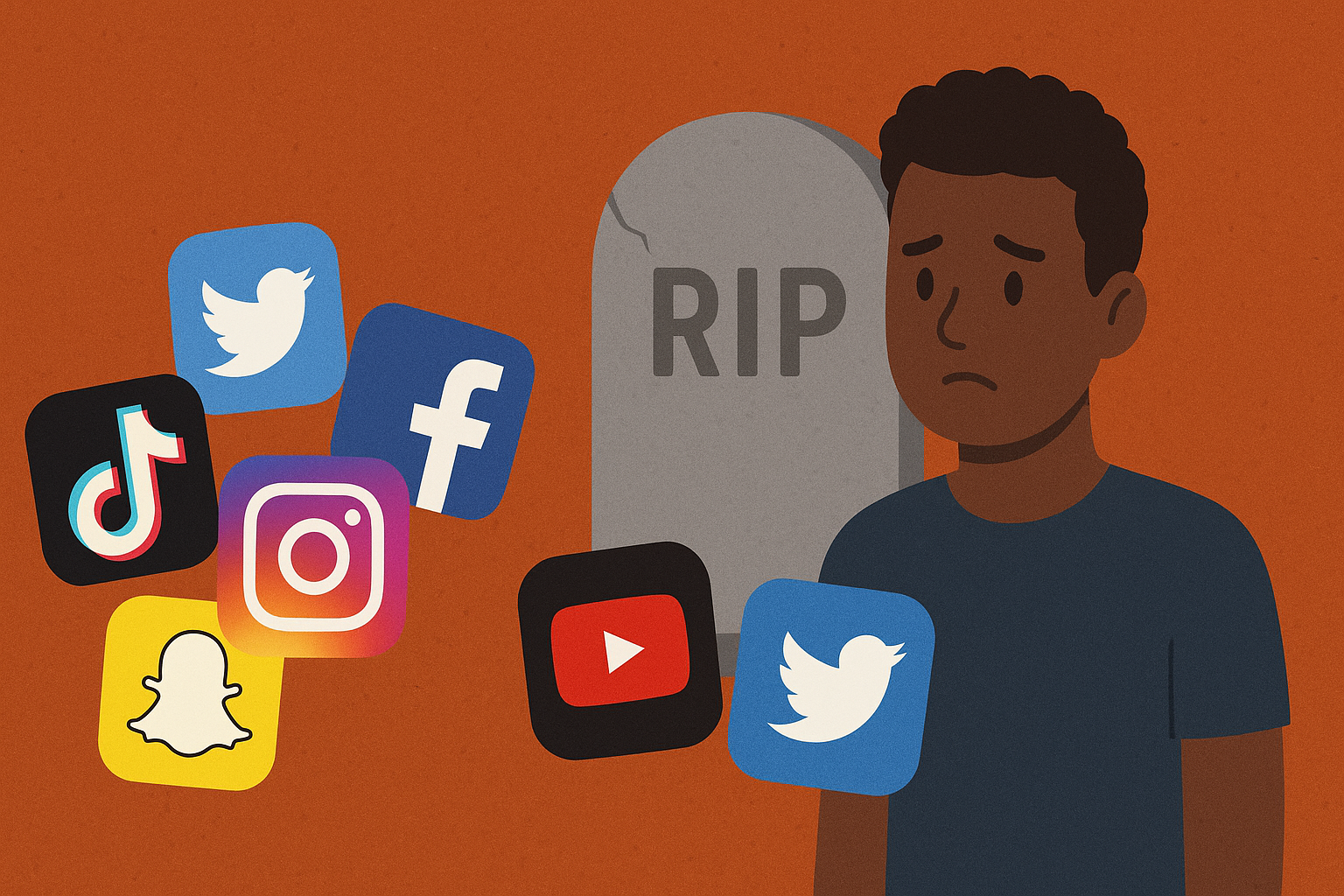TikTok is dead.
Instagram is dead.
Facebook is dead.
Twitter is dead.
Snapchat is dead.
They’re all DEAD.
There. I said it.
You’ve heard versions of this before. Maybe from a comedian, maybe from someone on a podcast, maybe from a viral thread that made its rounds until everyone forgot about it. But here’s the thing: I’ve said this countless times, in countless ways, and most people still won’t believe it until a celebrity cries about the algorithm or a brand gets exposed for manipulating its audience. Then suddenly the headlines light up, everyone gasps, and acts shocked like this wasn’t already written on the wall. That’s part of the show.
Someday I won’t sound like the crazy guy screaming into the void. Someday people will look back and say, “he was calculated.” But until then, I’ll keep writing here, on my blog, where I control the algorithm. My words live here as ideas, not as disposable bait for an engagement engine.
And let me tell you, it hurts. Not in the shallow way. Deeply. To watch my own species hypnotized by artificial dopamine. A like here, a comment there, a rush of fake validation, a sprinkle of money, and the illusion of celebrity. Media used to deliver a message. Now it siphons our attention, our time, our humanity through thin little tubes designed to fatten someone else’s ledger. We trade presence for performance. We’ve lost the plot.
Okay Brandon, what’s your point?
Justin, I’m glad you asked. And if the reader doesn’t think I’m insane for talking to myself in third person, I’ll keep going.
Actually, I’d keep going regardless.
Social media didn’t collapse because of one bad update or one scandal. It was doomed from the start. It was never built for us to thrive. NEWSFLASH: it was built to keep our eyes glued and our data flowing. A handful of corporations shape the content feed, the trends, the “what’s next.” They decide what you see, what you think you chose to see, and what you don’t even realize you missed. Monopolies don’t always show up in boardrooms with cigars. Sometimes they show up in your pocket, dressed as “choice” and “free.”
And we follow. We let them tell us how to feel, how to dress, who to be mad at, what to buy, who is worthy of attention. A friend of mine posted the yesterday day: “the new buzzword is psychosis.” She’s right. Even her recognition of the pattern told me she’s either awake or waking up. Either way, it gave me hope. Because that’s what this all is… a kind of psychosis. People losing track of what’s real because their “reality” is being curated by invisible hands.
If you’ve been online for more than a decade, you should already know this. All media, just like most big companies, is owned by very few. They push the same narratives from different angles, and it somehow still slips through the cracks of monopoly rules. If you want me to break that down more, join me at a Soapbox session, I could go on for hours.
This isn’t nostalgia. This is a call to reclaim.
The internet gave us beautiful things. Community. Creativity on a scale we’ve never seen before. Access. Connection. But convenience turned into dependency, and dependency turned into extraction. We became the product. Our names, faces, content, attention, all converted into data points and sold back to advertisers.
So here’s the blunt part: if you keep giving away your identity and your attention to these middlemen, you will keep losing yourself. Followers will look like influence, but it will feel hollow the moment an algorithm changes overnight. Likes will never be a currency for the soul.
And here’s where I step off the rant and offer a playbook:
How to start your exit (without becoming a hermit):
You don’t have to quit cold turkey. You don’t need to be dramatic. You do, however, need to take intentional steps toward reclaiming your independence. Here’s a practical playbook, things I’ve been doing and asking people to try:
- Buy your domain.
Yourname.com or a name that fits your work, it’s cheaper than you think and easier to set up than you remember MySpace being. Treat it like your home base. Post there like you would on social media, pictures, updates, essays, videos, anything. Tell people “check my site” instead of “follow me.” This is the modern equivalent of handing out a business card. - Own your content.
Hosting your photos, your essays, your video on a personal site or a simple newsletter means you control the rules. You choose who sees what and when. You don’t have to be fancy: a clean landing page + an email signup is powerful. - Use a newsletter.
Email is old tech… and that’s why it works. Newsletters are direct lines to real humans. People who sign up are actively interested. That’s different from passive scrolling. Start a weekly note. Make it short, real, and valuable. - Curate your feeds intentionally.
Reduce. Unfollow. Mute. Block. If a person or account consistently leaves you feeling worse, cut it out. Keep less, keep better. - Schedule social time.
Give yourself windows for posting and scrolling. Outside of that? Be offline. You’d be amazed what happens to your brain when it’s not repeatedly interrupted. - Create for humans, not for algorithms.
When you make art or write, do it for someone sitting across from you, not for a heatmap of attention. That changes everything about what you put into the world. - Learn the basics.
If you had a MySpace back in your teens, you probably learned HTML. Tap back into that confidence. Buy a template, drag and drop, or learn a few CMS skills. You already had them; someone just convinced you, you didn’t. - Trade, barter, collaborate locally.
Turn off the TV. Meet a neighbor. Host a pop up. The economy of attention is replaced with economies of real interaction skills swapped, prints sold, zines traded. Real economies are still human. - Protect your data.
Each cookie click, each “agree” you accept chips away at your privacy. Be stingy with permissions. Use the privacy settings. Read one T&C, just one, and then close the tab wiser.
The deeper reason to start now
This isn’t just about privacy. It’s about what it feels like to be alive. If everything you consume and create exits through an ad, your inner life gets cheaper. The conversations you have with yourself… your doubts, hopes, ideas, get drowned out by constant noise.
If you let this social media psychosis keep running, you won’t just lose time. You’ll lose the subtlety of presence. The ability to be bored and let your mind wander. The courage to sit with yourself and build something slow, something that doesn’t perform instantly for strangers.
So here’s the challenge. Gentle, but real: Pick one small step this week.
- Buy a domain and post one thing.
- Start a tiny newsletter. Ten to thirty people. Write your first note.
- Unfollow fifty accounts that don’t serve you.
- Take one weekend off screens. Cook for someone. Paint. Go outside.
Tell someone in real life what you did. Look them in the eye. Give them a card. Reclaim those rituals that remind us what being human feels like.
Social media is not a place. It’s a business model disguised as a habit. Habits can be broken. Models can be redesigned. You don’t need fame to reclaim yourself. You just need curiosity, a little courage, and maybe a domain name.
I’m not asking you to burn every app. I’m asking you to be deliberate. To take back pieces of yourself. To practice presence again.
Because if you keep scrolling like nothing matters, then nothing will. But if you start stepping back, even in small ways, you’ll meet yourself again. And the you of today will make the you of tomorrow proud.
Hope this helps,
—B


Leave a Reply